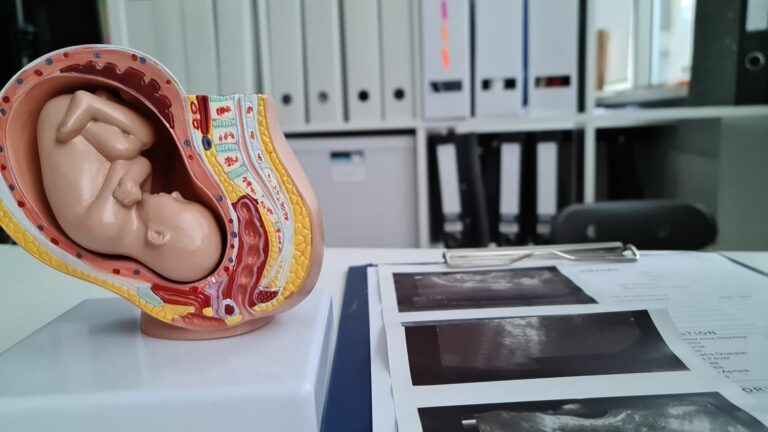
Maintaining a healthy weight is crucial for overall health and well-being, especially when it comes to fertility and In Vitro Fertilization (IVF) success.
Studies show that being overweight or underweight can negatively impact fertility in women, reducing the chances of conception and increasing the risk of pregnancy complications.
Indian women face unique challenges in weight management due to cultural dietary preferences, lifestyle factors, and genetic predispositions.
This article provides tailored guidance and strategies for Indian women seeking safe and sustainable weight loss to improve their chances of IVF success.
Key Takeaways
- Weight significantly impacts fertility and IVF success rates
- Indian women face specific challenges in achieving and maintaining a healthy weight
- Dietary modifications focusing on whole, unprocessed foods and healthy fats are essential
- Lifestyle changes such as stress management, sleep prioritization, and regular exercise play a vital role
- Safe, sustainable weight loss under professional guidance optimizes IVF outcomes
1. Weight and Fertility in Indian Women: A Beginner’s Guide
Understanding the Link:
- Weight and Hormones: A healthy weight promotes hormonal balance, which is crucial for ovulation and egg quality. Excess weight disrupts this balance, impacting ovulation and embryo implantation.
- Undernutrition: Being underweight can indicate nutritional deficiencies that hinder egg development and overall reproductive health.
Impact on IVF Success:
- Studies suggest a 10% weight loss can improve IVF outcomes for many women, even those with a normal BMI. (Source)
- Improved egg quality: Weight loss can enhance egg quality, leading to a higher chance of successful fertilization and embryo development.
- Reduced pregnancy risks: Maintaining a healthy weight lowers the risk of gestational diabetes, high blood pressure, and other complications during pregnancy.
Challenges for Indian Women:
- Dietary Patterns: Traditional Indian cuisine often emphasizes refined carbohydrates (white rice, breads) and saturated fats (ghee, fried foods), contributing to weight gain.
- Lifestyle Factors: Stress, lack of physical activity, and irregular sleep patterns are common concerns in India, hindering weight management efforts.
- PCOS: Polycystic Ovary Syndrome (PCOS) is a hormonal disorder affecting ovulation and weight management. It’s more prevalent among Indian women.
Actionable Steps:
- Consult your Doctor: Discuss your weight loss goals and IVF plans with your doctor. They can assess your individual needs and recommend a safe approach.
- Seek Expert Guidance: Consider consulting a registered dietitian specializing in Indian cuisine. They can create a personalized meal plan incorporating weight-loss strategies and cultural preferences.
- Embrace a Balanced Diet: Focus on whole, unprocessed foods like fruits, vegetables, legumes, and whole grains.
- Incorporate Healthy Fats: Include healthy fats like those found in nuts, seeds, and olive oil for satiety and hormonal balance.
- Choose Lean Protein Sources: Opt for lean protein sources like lentils, chickpeas, low-fat dairy products, fish, and skinless chicken to support egg development.
- Portion Control: Implement portion control strategies like using smaller plates and measuring ingredients.
- Mindful Eating: Practice mindful eating – pay attention to hunger cues, eat slowly, and savor your food to avoid overeating.
What traditional Indian foods do you think could be modified to support weight loss and fertility? Share your ideas in the comments below!
Additional Resources:
- The National Institute of Child Health and Human Development (NICHD)
- The American Society for Reproductive Medicine (ASRM)
- The Indian Dietetic Association (IDA)
2. Dietary Focus: Optimizing Your Plate for IVF Success
Traditional Staples, New Approach:
Many Indian foods are nutritious, but some adjustments can promote weight loss and improve fertility outcomes:
- Rice: Switch to brown rice, quinoa, or millets. These whole grains provide sustained energy and fiber, aiding weight management. Practice portion control with rice-based dishes.
- Roti/Chapati: Opt for whole-wheat flour for increased fiber and nutrients compared to refined flour. Pair them with lean protein and vegetables for a balanced meal.
- Dairy: Choose low-fat or fat-free yogurt, paneer, and milk for calcium and protein without excess calories.
Focus on Healthy Fats:
- Limit Deep-Fried Foods: Reduce intake of ghee-laden dishes, pakoras, and sweets high in saturated fats.
- Embrace Healthy Fats: Include nuts, seeds, olive oil, and avocados in moderation for satiety, hormonal balance, and improved egg quality.
Indian Superfoods for Weight Loss & IVF:
- Leafy Greens: Spinach (palak), fenugreek (methi), and amaranth leaves are rich in iron, folic acid, and antioxidants, crucial for egg health.
- Legumes and Lentils: Powerhouses of protein and fiber, essential for healthy ovulation and development. Include chickpeas (chana), moong dal, kidney beans (rajma), and black lentils (urad dal).
- Spices: Turmeric, ginger, cumin, coriander, black pepper are known for anti-inflammatory properties and may support metabolism. Use them liberally in your cooking.
- Fruits: Opt for low-glycemic fruits like berries, apples, pears, and guavas to regulate blood sugar and promote weight management.
Meal Planning Strategies for Weight Loss:
- Plan Ahead: Create a weekly meal plan featuring balanced meals and healthy snacks to avoid unhealthy choices when pressed for time.
- Don’t Skip Meals: Skipping meals can disrupt your metabolism and lead to overeating later. Aim for 3 balanced meals and 1-2 healthy snacks throughout the day.
- Spice it Up!: Flavorful spices can make healthy meals more satisfying, reducing cravings for sugary or fatty foods.
Vegetarian Protein Sources for Optimal Weight Loss:
- Legumes: Lentils, chickpeas, and beans are excellent sources of plant-based protein and fiber.
- Soy Products: Tofu, tempeh, and fortified soymilk provide protein and essential nutrients.
- Nuts and Seeds: Almonds, walnuts, cashews, pumpkin seeds, and sunflower seeds are great snack options offering protein and healthy fats.
Sample Meal Ideas for Weight Loss:
- Breakfast: Vegetable omelet with a whole-wheat roti or oatmeal with berries and nuts.
- Lunch: Lentil soup with a green salad and brown rice.
- Dinner: Grilled fish or chicken with stir-fried vegetables and a small portion of quinoa.
- Snacks: Pair fruit with yogurt, enjoy a handful of nuts and seeds, or have vegetable sticks with hummus.
Remember: If you have PCOS, consult your doctor and dietician to create a personalized diet plan considering your specific hormonal needs.
What are your favorite healthy Indian dishes that support weight loss? Let us know in the comments!
By making these adjustments to your diet, you can promote weight loss, improve egg quality, and optimize your chances of IVF success.
Check out our articles on IVF Process, IVF Cost in India, and What to Expect from IVF for more information on your fertility journey.
3. Lifestyle Modifications: Key Changes for Weight Loss and IVF Success
Weight management and fertility success go beyond just diet. These lifestyle modifications can have a significant impact on your journey:
1. Stress Management:
- Chronic Stress and Weight: Stress triggers the release of cortisol, a hormone that promotes fat storage, especially around the abdomen. This can hinder weight loss and negatively impact fertility.
- Stress-Busting Techniques:
- Yoga: Combines physical postures with mindful breathing for relaxation.
- Meditation: Focuses on calming the mind and reducing anxiety.
- Deep breathing exercises: Simple yet effective for immediate stress relief.
2. Prioritize Sleep:
- The Sleep-Weight Connection: Lack of quality sleep alters hormones that regulate hunger and metabolism, increasing cravings and making weight loss difficult.
- Fertility and Sleep: Insufficient sleep disrupts hormone production crucial for ovulation and overall reproductive health.
- Aim for 7-8 Hours: Consistent sleep schedules and a relaxing bedtime routine help achieve optimal sleep hours.
3. Increase Physical Activity:
- Moderate-Intensity Exercise: Aim for at least 30 minutes of moderate-intensity exercise most days of the week. Brisk walking, swimming, dancing are all great options.
- Benefits for Weight Loss: Helps burn calories and boost metabolism.
- Improved Fertility: Studies suggest regular exercise can improve ovulation and IVF outcomes.
4. Limit Sedentary Behavior:
- Break Up Sitting Time: Prolonged sitting disrupts metabolic functions, contributing to weight gain.
- Incorporate Movement: Take short breaks every hour to stand, stretch, or walk.
- NEAT Activities: Non-Exercise Activity Thermogenesis (NEAT) encompasses all the small movements and tasks you do daily. Increase NEAT by taking stairs, gardening, etc.
5. Address Other Lifestyle Factors:
- Smoking Cessation: Smoking harms egg quality and can significantly reduce IVF success.
- Limit Alcohol Consumption: Excessive alcohol intake can disrupt hormone balance and fertility.
Important Note: Lifestyle changes may take time to see full benefits. Be consistent and patient with yourself.
How have you incorporated stress management techniques into your daily routine? Share your tips in the comments below!
4. The Role of Support: Finding Your Community for Success
Embarking on a weight loss and IVF journey can be emotionally and physically challenging. A strong support system can make a significant difference in your success.
1. Seek Professional Guidance:
- Registered Dietitian: A registered dietitian specializing in fertility and Indian cuisine can provide personalized meal plans, accountability, and ongoing support.
- Therapist or Counselor: A mental health professional can help with stress management, coping with emotional challenges, and building healthy habits.
2. Connect with Support Groups:
- IVF Support Groups: Sharing experiences and challenges with women on similar journeys can provide invaluable emotional support and motivation. Join IVF support groups in India or online communities.
- Weight Loss Support Groups: Join groups focused on healthy weight loss and discuss common obstacles faced by Indian women. Search online platforms or within your local community.
3. Partner/Family Support:
- Communicate Your Needs: Share your goals and journey with your partner or family. Ask for their support in creating a healthy environment at home.
- Team Effort: Encourage healthy eating and lifestyle habits as a family for shared benefits.
Benefits of Social Support:
- Motivation and Accountability: Knowing you are not alone can boost your determination and help you stay on track.
- Sharing Knowledge and Resources: Learn from others, exchange diet and exercise tips, and discover coping strategies.
- Emotional Support: Having a safe space to vent, celebrate successes, and navigate challenges is essential for your mental well-being.
Finding Support:
- Online communities: Explore social media platforms or forums dedicated to weight loss for Indian women or IVF support groups.
- Local Support Groups: Check community centers or hospitals for relevant support groups in your area. Consider exploring IVF support groups in cities like Gurgaon, Chandigarh, Bhubaneswar, Dehradun, Srinagar, Jamshedpur, Mangalore, Mysore, Raipur, and Kolapur.
- Your Healthcare Team: Ask your doctor or fertility specialist if they recommend support groups or resources.
Remember, you don’t have to go through this alone. Support empowers you to achieve your goals.
Do you have a strong support network in place? If not, what steps can you take to build one? Let us know in the comments!
5. Safe, Sustainable Weight Loss: Setting Realistic Goals for IVF Success
While achieving a healthy weight before IVF is important, doing it safely and sustainably is paramount.
Here’s how to ensure your approach prioritizes long-term health:
1. Realistic Expectations:
- Gradual Weight Loss: Aim for a slow and steady weight loss of 1-2 pounds per week. This is healthier and more likely to be sustained over time.
- Focus on Overall Health: Remember that IVF success is influenced by many factors beyond weight. Diet and lifestyle are crucial, but don’t put undue pressure on yourself to reach a specific number on the scale.
2. Avoid Fad Diets:
- Short-Term Results: Fad diets often promise quick weight loss but are unsustainable and can be nutritionally deficient.
- Metabolic Damage: Crash dieting can negatively impact metabolism, making weight regain likely and future weight loss efforts more difficult.
- May Negatively Impact Egg Quality: Extreme restriction can deprive your body of essential nutrients for healthy egg development.
3. Dangers of Rapid Weight Loss:
- Nutritional Deficiencies: Rapid weight loss may leave you lacking in crucial vitamins and minerals necessary for optimal fertility.
- Gallstones: Rapid weight loss can increase the risk of gallstone formation.
- Hormonal Imbalances: Extreme weight changes can further disrupt hormonal balance, potentially impacting ovulation and IVF success.
4. Prioritize Sustainable Changes:
- Focus on Whole Foods: Base your diet around whole, unprocessed foods like fruits, vegetables, legumes, and whole grains.
- Incorporate Regular Exercise: Find an enjoyable form of physical activity and make it a habit.
- Mindful Eating Practices: Cultivate awareness of your hunger, fullness, and food choices.
5. Professional Guidance is Key:
- Consult Your Fertility Specialist: Discuss your weight loss goals and get their input on a safe rate of weight loss before IVF.
- Work with a Registered Dietitian: They will help you design a balanced meal plan, tailored to your individual needs and fertility goals.
Remember: Healthy, sustainable weight loss takes time and consistency. Focus on building long-term habits that support your overall well-being and optimize your chances for IVF success.
What sustainable lifestyle changes have you made on your weight loss and IVF journey? Share your experiences and inspire others in the comments!
Final Thoughts
- Weight significantly impacts fertility and IVF success rates. Achieving a healthy weight through safe, sustainable methods can improve egg quality, reduce pregnancy risks, and optimize IVF outcomes.
- Indian women face unique challenges in weight management due to cultural dietary preferences, lifestyle factors, and genetic predispositions like PCOS. Tailored guidance and strategies are essential for success.
- Dietary modifications focusing on whole, unprocessed foods, healthy fats, and culturally-appropriate nutrient-dense options are key. Meal planning, portion control, and mindful eating practices support weight loss efforts.
- Lifestyle changes such as stress management, prioritizing sleep, increasing physical activity, limiting sedentary behavior, and addressing factors like smoking and alcohol consumption play a vital role in weight loss and fertility.
- Building a strong support system through professional guidance, connecting with support groups, and involving partners and family can provide motivation, accountability, and emotional support throughout the journey.
- Setting realistic expectations, avoiding fad diets, and prioritizing sustainable changes under the guidance of healthcare professionals ensure safe and long-lasting weight loss for optimal IVF success.
By implementing these evidence-based strategies and seeking personalized guidance, Indian women can safely and effectively manage their weight to improve their fertility and chances of IVF success.
Remember, every woman’s journey is unique, and small, consistent changes can lead to significant improvements in overall health and well-being.
Share this article with a friend or family member who may benefit from this information, and let us know in the comments how you plan to incorporate these strategies into your own weight loss and IVF journey.
Together, we can support and empower each other on the path to parenthood.






